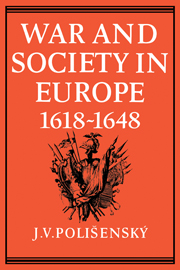Book contents
- Frontmatter
- Contents
- Preface
- Map of Czechoslovakia with list of locations of archives and libraries
- Introduction
- PART ONE PROBLEMS IN THE HISTORY OF THE THIRTY YEARS' WAR
- PART TWO THE EFFECTS OF THE THIRTY YEARS' WAR
- Conclusion
- Notes
- Appendix Tabular survey of archives, libraries and individual collections
- Index
- Frontmatter
- Contents
- Preface
- Map of Czechoslovakia with list of locations of archives and libraries
- Introduction
- PART ONE PROBLEMS IN THE HISTORY OF THE THIRTY YEARS' WAR
- PART TWO THE EFFECTS OF THE THIRTY YEARS' WAR
- Conclusion
- Notes
- Appendix Tabular survey of archives, libraries and individual collections
- Index
Summary
SEVENTEENTH-CENTURY STUDIES AND THEIR CONTEMPORARY SIGNIFICANCE
At about the same time that the Fourth Meeting of Czechoslovak Historians reached the conclusion that the seventeenth and eighteenth centuries form a period which deserves more attention, similar opinions began to be expressed elsewhere. This was not purely a matter of chance. The French Marxist writer, Pierre Daix, in his article ‘The unknown 17th century’, pointed out that historians have until now concentrated more on the sixteenth and eighteenth centuries, which seem on the surface to have been far more ‘revolutionary’. ‘Our knowledge of the seventeenth century is minimal and is riddled with misunderstanding; it is high time for a revision.’ Essentially the same sentiments have been expressed by Pierre Vilar in his studies of the Spanish ‘Golden Age’ and historical reality, by Pierre Chaunu in his Civilization of Classical Europe, Pierre Goubert in his captivating monograph Louis XIV and Twenty Million Frenchmen, and Fernand Braudel in his brilliant, but slightly specious, Material Civilization and Capitalism. All this agrees substantially with the conclusions of the historians who, in a number of articles in Past and Present, saw the period 1560–1660 as a European crisis, with those of the Soviet historians, B. F. Porshnev, N. A. Chistozvonov and M. A. Barg, and finally with the opinions of a group of Americans who place the beginnings of the early modern age in the period 1550–1650.
- Type
- Chapter
- Information
- War and Society in Europe 1618–1648 , pp. 1 - 14Publisher: Cambridge University PressPrint publication year: 1978



